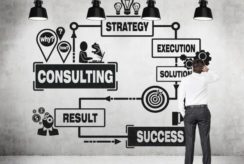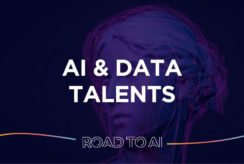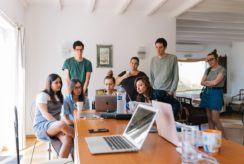The 2018 Women’s Forum Global Meeting gathered global leaders with the aim of finding solutions to bridge divides and move towards more inclusive progress. Wavestone was a partner of this event, participating in a number of these discussions.
From November 14-16, more than 250 speakers led conferences, round-tables and workshops at the “Carrousel du Louvre” in Paris.
Bridging humanity for inclusive progress
Given the magnitude of global challenges, innovative solutions must be implemented for a fruitful and inclusive future. Men must work alongside women to attain long-term economic, social and environmental growth. This was the vision of the 2018 Global Meeting, as we brought together the public and private sectors from various industries, geographical locations, cultures and religions, in order to “Bridge humanity for inclusive progress”.
Within this intersectionality, taking a gendered approach is important from both a social and financial perspective. Indeed, the current gender gap deprives the global economy of as much as $28 trillion. From addressing performance bias at work, to empowering women in local, national and international communities; today’s change makers and tomorrow’s leaders came together to bring an intersectional resolution to issues concerning three key pillars: the power of mindset shift, reimagining organisations, putting technology to work.
Discover the visions of the 2018 edition's prestigious speakers
Shifting Mindsets
Reimagining organisations
Putting Technology to Work
The power of mindset shift
To make measurable change in business and society, shifting perceptions and raising awareness on gender issues is vital. It is imperative not only from a moral standpoint but also financially, socially, and economically. Changing our mindsets and breaking stereotypes can only happen if we recognize our biases. For instance, the performance bias plays a large role in preventing women from being promoted, in part leading to the decline in the percentage ratio of promotion, which dropped to a mere 24% of managerial positions being awarded to women in 2018. Similarly, there are some serious misconceptions regarding women’s ambitions and professional motivations.
Reimagining Organisations
In the age of the 4th Industrial Revolution, adaptability is key to an organisation’s development. From century-old public institutions to first-year startups, organisations of all shapes and sizes face new and interconnected challenges that require fresh and diverse perspectives and solutions. How can they reinvent themselves to overcome global issues such as climate change, technological disruption and political upheavals? It is imperative that these companies integrate inclusion and diversity into their core values to make business future-proof.
Putting technology to work
Accelerating technological change – including artificial intelligence and automation – and new ways of working are challenging both employees and business leaders alike. According to McKinsey, these factors could force 375 million people globally to change occupations. Yet these developments affect men and women differently. Jobs will be created, destroyed, and will call for different forms of leadership and skills. Some changes will worsen existing divides, while others may close the gender gap. New digital platforms are providing women with greater opportunities, yet worldwide only 45% of women are connected to the internet compared to 51% of men. Addressing structural divides in women’s leadership in STEM, as well as skills gaps, could play a transformative role in shaping this digital transformation to the benefit of women.



